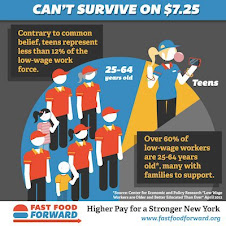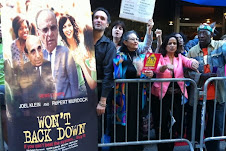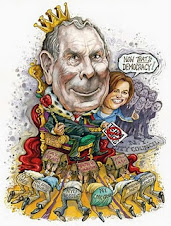Teachers are subject to unprecedented workplace, particularly in the current teacher-bashing climate, and in the New York City Department of Education with administrators trained in the privately funded (by organizations such as the Broad Foundation and the Partnership for New York City) Leadership Academy --which the DOE presses superintendents to hire principals from.
The following article is mainly regarding bullying at the higher education level, but many of the issues will be familiar to teachers and other workers.
John Tarleton's article, "PSC Backs Healthy Workplace Bill: Protection vs. Bullying at Work" appeared in "Clarion," the publication of the Professional Staff Congress (PSC) of the City University of New York (CUNY), June, 2012.
Public concern about school bullying has increased greatly in recent years. No longer seen as an inevitable part of growing up, school bullying is now understood as an important social problem that can affect both health and learning, and as a problem that school districts have a responsibility to solve.
Now a coalition of unions and worker advocacy groups in New York State is taking aim at another venue where bullying is widespread but little acknowledged – the workplace. The PSC and its coalition allies aim to win passage of the Healthy Workplace Bill (S4289/A4258), a measure that would provide remedies to workers whose employers allow them to be subjected to a pattern of abusive conduct on the job.
ADULT VICTIMS
“Bullying happens on many levels,” says Paul Washington, vice chair of the PSC’s Higher Education Officer (HEO) Chapter. “Just because we are adults doesn’t mean that we don’t get disrespected or demeaned.” When HEO chapter leaders visit CUNY campuses, Washington told Clarion, “We always have people pulling us aside and telling us they have been bullied but are afraid to speak out about it.”
While victims of bullying often remain silent, when they do speak out the revelations can be shocking. Court papers in personal lawsuit by two HEO-series employees a few years ago provide a clear illustration of what bullying can be like.
Emelise Aleandri and Gloria Salerno charged that the director of CUNY’s John D. Calandra Italian American Institute, Joseph Scelsa, had relentlessly targeted them for more than a decade after he learned they were organizing a women’s support group for female employees who were chafing under Scelsa’s management. Considering this an act of disloyalty, Scelsa ordered the group to disband, they said – and then went after them.
Scelsa waged “a campaign of obsessive control and bureaucratic maneuvers designed to humiliate and slowly choke them out of their jobs,” the two women told Clarion. Salerno, for example, was stripped of her duties and instructed to sit quietly at an empty makeshift desk constructed from a plank of wood placed atop two filing cabinets – with no access to a computer and no assignments to complete.
Aleandri, who was a producer, writer and host for a CUNY-TV show, saw her job responsibilities whittled away while subordinates were promoted over her. Relegated for nine years to an office without a telephone, Aleandri said she was forced to route all her professional communications through her boss’s office so that he could monitor everything she said. On a day-to-day basis, she told Clarion, there were “a million little things” that created a hostile work environment.
When Aleandri and Salerno sued for gender discrimination, their case was dismissed. A state judge found that Scelsa did indeed abuse and humiliate the institute’s employees – but that he directed such treatment toward men as well as women. Under current law, harassment of employees that would be illegal if used to discriminate becomes legal if not directed against a particular group. And that, in a nutshell, is the case for legislation against bullying in the workplace: to establish in law that abusive treatment of workers is always wrong.
(Aleandri and Salerno did reach a financial settlement with CUNY, after the judge supported their claim ruling that they had been subject to retaliation for filing a discrimination complaint. Civil rights law bans such retaliation, regardless of whether the complaint is sustained.)
WIDESPREAD
A 2010 Zogby survey found that 53.5 million Americans (or about one-third of the US workforce) have experienced workplace bullying, while 23 million more have witnessed it. According to the poll, 62% of workplace bullies are men while 58% of targets are women. A follow-up survey by Zogby found public support running strongly in favor of legislation to protect workers from “abusive conduct” by a margin of 64% to 24%.
The HEO Chapter has taken an active role in pressing this issue, says Chapter Chair Iris DeLutro, because HEOs are vulnerable to bullying at CUNY. They have fewer job protections than full-time faculty and are increasingly pushed by management to do more work to compensate for budget cuts and the departure of colleagues who took early retirement. These pressures create fertile soil for bullying of employees. “More is expected for less, and too often people are treated badly,”said DeLutro, who has working to change state law on workplace bullying since 2004.
The Healthy Workplace Bill now under consideration in Albany is based on a simple idea: people should be able to do their jobs without being harassed and abused. The legislation would enable workers to sue if they can prove that their employer allowed them to become the target of this kind of sustained mistreatment. Actions could be brought for medical expenses, lost wages, compensation for emotional suffering and punitive damages.
DIVIDED LEGISLATURE
In 2010, the New York State Senate passed the Healthy Workplace Bill with broad bipartisan support, only to have the legislation buried in committee in the State Assembly. This year, the bill has 85 co-sponsors in the State Assembly, a sizable majority of that body’s 150 members. However, the bill does not currently have the support of a majority of the members of the Republican-led State Senate.
“We’ve got to put the pressure on and give State legislators the support they need to pass this,” DeLutro said. DeLutro and other PSC members traveled to Albany on May 22 to lobby for the Healthy Workplace Bill and other union legislative priorities. The grassroots lobbying effort was organized with the PSC’s state affiliate, New York State United Teachers (NYSUT), which has long supported the Healthy Workplace Bill.
Employer associations claim that the Healthy Workplace Bill would be a “job-killer.” But those who study workplace psychology insist that ensuring emotionally healthy workplaces will be a boon to the economy.
$300 BILLION
“I think it’s important to have a healthy work environment so that we can perform at our optimum levels,” said Clara Wajngurt, a Queensborough Community College professor who is studying bullying and the academic workplace. “I’ve seen people leave jobs who were very good workers when the situation could have been handled differently.”
According to the New York State Psychological Association, which supports the legislation, job stress costs the US economy $300 billion a year in absenteeism, diminished productivity, employee turnover and direct medical, legal and insurance fees.
“Because society and the media have projected the idea that a boss is supposed to be yelling and screaming and demeaning to their employees, we think this is how it’s supposed to be,” Washington told Clarion. “We are going to have greater worker productivity once people are able to come out of the shadows and confront this.”
And in the end, he said, “It’s just the right thing to do.”
What is workplace bullying?
Workplace bullying is repeated, unreasonable actions aimed at intimidating, humiliating, degrading or undermining an employee or group of employees. Bullying may create a risk to employee health and safety.
Workplace bullying often involves abuse or misuse of power. Bullying behavior creates feelings of defenselessness and injustice in the target and undermines an individual's right to dignity at work.
Bullying is different from aggression, which may involve only a single act. Bullying involves repeated attacks, creating an ongoing pattern of abusive behavior.
Bosses who are tough or demanding or who set high standards are not necessarily bullies, so long as they are respectful and fair and their expectations are reasonable.
EXAMPLES OF WORKPLACE BULLYING
*use of abusive, insulting or offensive language
*excluding, isolating or marginalizing an employee
*constant and unwarranted criticism, without factual justification
*frightening or intimidating behavior
*tampering with someone else's work, work equipment, or personal belongings
*deliberately withholding information or resources necessary for effective work performance
*excessive monitoring or micromanaging
*being targeted for impossible assignments or deadlines
PHYSICAL & MENTAL HEALTH ISSUES THAT CAN RESULT
*anxiety
*sleep deprivation
*gastrointestinal disorders
*musculoskeletal disorders
*hypertension
*increased risk of cardiovascular illness
*reduced self-esteem
WHAT EMPLOYEES CAN DO
Regain control:
*Recognize that you are being bullied.
*Realize that you are not the source of the problem.
*Understand that bullying is about control and not about your performance.
Take action:
*Speak directly to the bully. Calmly state that his/her behavior is unacceptable and must stop. Ask that any discussions be constructive and professional.
*Avoid being alone with the bully.
*Create a paper or digital train of evidence. Document incidents and witnesses. Save harassing e-mails or memos.
*Seek support from trusted colleagues.
*Consult with a grievance counselor at [your union office] about what options may be available to you.
*Work for the enactment of legislation against workplace bullying.
(Adapted from a New York Committee for Occupational Safety & Health resource paper.)
News report: “Workplace Bullying 'Epidemic' Worse Than Sexual Harassment”
UPDATE: Education Week, July 20, 2012: "Online Campaign Winds Down for Bullied Bus Monitor."
































No comments:
Post a Comment